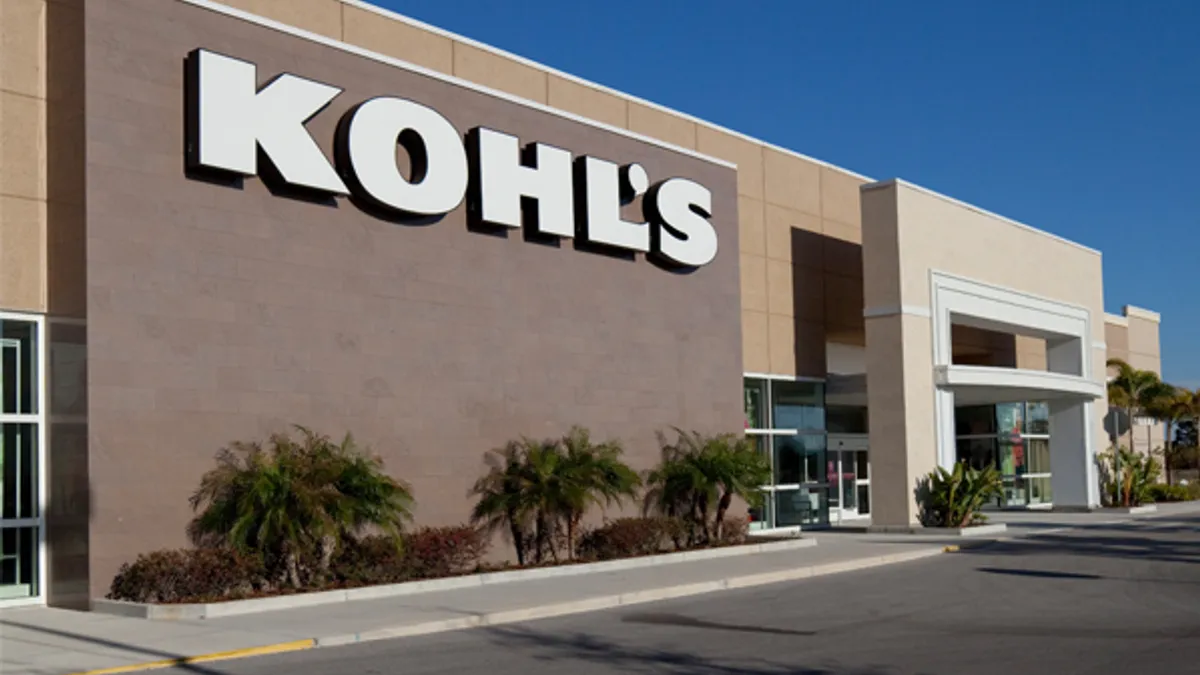Dive Brief:
-
Expressing disappointment and impatience with what they called Kohl's underperforming stock, hedge fund Engine Capital, which owns 1% of Kohl's shares, on Monday urged the department store to "publicly commit to conducting a full review of strategic alternatives."
-
In a letter to the Kohl's board also made public, Engine Capital partners Arnaud Ajdler and Brad Favreau outlined what they called "two viable paths" — splitting off its e-commerce and legacy store operations into two companies, or selling itself.
-
"The Kohl's board and management team continuously examine all opportunities for maximizing shareholder value," Kohl's said in an emailed statement. "Our strong performance this year demonstrates that our strategy is gaining traction and driving results. We appreciate the ongoing dialogue we are having with our shareholders and value their input and perspectives."
Dive Insight:
Engine Capital's Monday morning salvo comes as no surprise — Kohl's was already rumored to be facing investor pressure to consider an e-commerce spinoff.
The maneuver, which entails severing a retailer's online and brick-and-mortar operations while keeping its brand and customer experience intact, is a favored tactic among financial pros these days, at least when it comes to department stores. It's not unprecedented — HBC retailers Saks Fifth Avenue, off-price Saks Off 5th and Hudson's Bay Co. all recently went through such separations — though how that is affecting their operations remains to be seen.
In its letter, Engine Capital held up a rumored initial public offering for the newly freed Saks.com as a model, saying that its estimate that "Kohl's' digital business alone would be worth $12.4 billion, around 40% higher than the current enterprise value of the entire business today" is conservative.
"[T]here is no excuse for the Board to cling to the status quo," Ajdler and Favreau wrote in their letter.
While Kohl's pushed back on Monday, its board is likely to at least contemplate both scenarios outlined by Engine Capital. Macy's initially resisted the idea when an activist investment firm suggested the department store could unleash billions in value if it separated out its online operations. But last month Macy's hired the very firm that helped Saks orchestrate its breakup.
While financial wizards are keen on the idea, many analysts and retail experts are not, citing the difficulty of two companies maintaining seamless branding, merchandising and fulfillment as demanded by the customer. The setup, less than a year old, took hundreds of contractual agreements to achieve that, people familiar with the Saks split have said.
"Splitting companies into two makes very little sense from the perspective of where demand is headed," GlobalData Managing Director Neil Saunders said by email. "Most retailers, including Walmart and Amazon appear to recognize this and are spending more time integrating their online and offline operations."
This is Kohl's second scuffle with activist investors this year. In March Kohl's defended its board from an investor group whose demands included board and operational changes as well as steps to unlock some $7 billion to $8 billion in real estate value.















